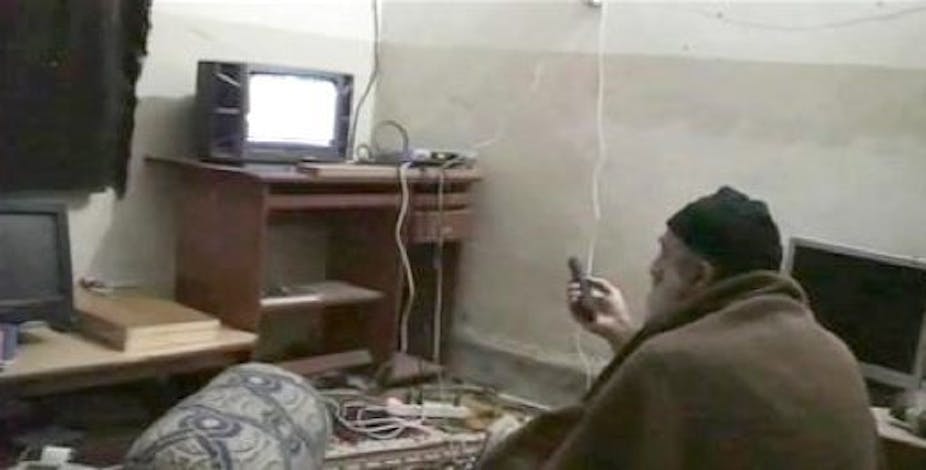A lot has been written about Zero Dark Thirty’s torture narrative.
Alex Gibney, whose Taxi to the Dark Side traced the abuses of the Bush torture system, gives one of the best accounts. Having seen the film I agree with two things critics have been saying.
First, this is a technically superb piece of cinema. Director Katheryn Bigelow’s attention to detail and many intelligent choices makes her treatment of torture even more disappointing.
Second, the story arc clearly implies that torture tactics were central rather than incidental in gathering the information that led to the capture of Osama bin Laden. This is emphasised throughout the film not just through the opening torture scenes.
Bigelow’s claim that she is just showing torture as an unsavory “part of the story” does not ring true.
But this account of the hunt for Osama Bin Laden reveals something more important about the war on terror.
For me the key moment occurs mid way into the film when Maya, (Jessica Chastain), Bigelow’s CIA agent hero, is trying to convince one of her colleagues to allocate more surveillance resources to tracking down the man she believes is bin Laden’s courier.
A lot of my friends have died working on this … I believe I have been spared so that I can finish the job.
In many ways, the film is about the politics of certainty. As the case that Maya has built begins to centre on the compound in Abbottabad where bin Laden was eventually found and killed, the Director of the CIA asks his senior officers one by one what they think. Their assessments vary from 60% to 80% certainty that the “third man” they have seen in the compound is in fact the head of al Qaeda. Again Maya has a different opinion.
“One hundred percent,” she boldly asserts.
“Ok 95%, ‘cause I know certainty freaks you guys out.”
It is this same combination, absolute certainty and a sense of being chosen by God, or in Maya’s case spared by him, to undertake a designated mission, that is at the heart of George Bush’s construction of the war on terror.
Time journalist Michael Duffy, in an assessment of the Bush Presidency one year on from September 11, wrote that the President had spoken privately to friends and advisers, “of being chosen by the grace of God to lead at that moment”. This sense of messianic mission is confirmed by a number of other accounts.
Scholars have analysed his speeches in detail and have concluded that although past presidents have often invoked God and have even portrayed America as a land of chosen people, no president has done this anywhere as often or as explicitly as George Bush. Political scientist Rodgers Smith concludes his analysis:
The president has employed his prophetic providentialist discourse most often in speeches defending foreign policies that he knows to be questioned, if not condemned, in moral traditions that have long been powerful in the United States … Time and time again, he maintained that “the plan of Heaven” included an American “mission to promote liberty around the world” in which the United States was called “to lead the cause,” a cause that included a first-strike war against Iraq.
It is this central belief in the “plan of Heaven” that led to all the other abuses of the war on terror, including torture. A belief in certainty, in absolute good and absolute evil, leaves no room to debate the morality of means and ends.
There is a long line of “outlaw heroes” in the Hollywood film cannon, from westerns, Schwarzenegger action flicks, to the recent crop of superhero films. This tradition invokes the need for renegade fighters for justice to take matters into their own hands when the processes of traditional law prevent retribution.
Theologians Robert Jewett and John Shelton Lawrence have shown how this belief system is both at the heart of the biblical tradition of messianic “zealous warfare” and the Bush war on terror.
Zero Dark Thirty reminds us that in the Bush war on terror, the outlaw hero tradition of retributive zealous warfare was no longer relegated to the outside. It found a home deep in the heart of the American political system.
Just like George Bush, who famously declared that he wanted bin Laden “dead or alive” just like the old Western posters he remembered from his childhood, Maya’s hunt for bin Laden is intensely personal. She says to the SEAL team:
Bin Laden is there and you’re going to kill him for me.
This statement should be at least as controversial as the torture scenes. The film clearly sets up the raid as an assassination rather than the “capture or kill” mission that the Obama administration has consistently claimed it was.
And this reminds us that although he may have curbed some of the worst excesses of the Bush war on terror Obama’s policies, including a marked increase in drone assassinations and a continuing surveillance program, have in some senses enshrined the politics of secrecy and retributive terror that he promised to end.

